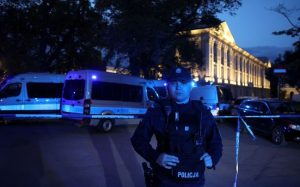‘Tears of joy’ – Sudan capital gets first aid convoy since war began
3 min readA convoy carrying food aid has reached Sudan’s capital, Khartoum, marking the first such delivery since the civil war began in April 2023. The ongoing conflict, which pits the Sudanese army against the paramilitary Rapid Support Forces (RSF), has caused a devastating humanitarian crisis, leaving millions in urgent need of assistance.
The United Nations has described Sudan’s crisis as the “world’s worst hunger crisis,” with nearly half of the population—around 24.6 million people—facing severe food insecurity. The fighting between the two factions has disrupted food production and distribution, and the resulting blockades have made it extremely difficult for aid to reach those in need. However, on Thursday, a breakthrough occurred when 28 trucks filled with much-needed supplies entered the south of Khartoum, providing a glimmer of hope to the people of the capital.
Duaa Tariq, a humanitarian worker with Sudanese group Emergency Response Rooms, shared her emotional reaction to the arrival of the convoy. She described the moment as filled with “tears of laughter and joy,” emphasizing the immense relief and exhaustion felt by those who had worked tirelessly to make the delivery possible. According to Tariq, the journey to securing the convoy was fraught with difficulties, as both the army and RSF had set up security roadblocks that hindered aid efforts.
The convoy, which included five trucks from UNICEF, delivered vital food and medical supplies to Al Bashayer Hospital and other healthcare facilities in Khartoum. For many in the city, this was a long-awaited lifeline. Tariq explained that the people of Khartoum had been desperate for aid, having tried various methods to receive help, but the only solution to alleviating the growing famine was the arrival of this convoy.
The United Nations and local Sudanese community groups had negotiated with both the army and RSF to allow the aid to reach the capital, overcoming the numerous obstacles posed by the conflict. The successful delivery is a rare achievement in the context of a crisis where such coordination has often been impeded by ongoing fighting and security concerns.
Experts have been warning for months that Sudan is on the brink of a worsening famine. The Integrated Food Phase Classification (IPC) recently reported that Sudan’s food crisis continues to deepen, with millions struggling to survive amid the violence. The fighting, which began after a 2021 coup staged by the army and RSF, has led to widespread displacement and devastation. The conflict has now entered its 20th month, with no resolution in sight.
The United States’ special envoy for Sudan, Tom Perriello, stated in May that estimates suggest up to 150,000 people have died as a result of the war. More than 11 million people have been displaced, fleeing their homes in search of safety and food. Despite various mediation efforts by international organizations, peace talks have largely failed to end the fighting between the two factions.
The situation remains dire, and while the arrival of this aid convoy is a significant step forward, many more supplies are needed to prevent further suffering. Aid agencies continue to call for increased international support and for greater access to vulnerable areas in Sudan. The international community faces mounting pressure to help stabilize the situation, address the humanitarian needs, and find a way to end the conflict that has claimed so many lives.
In the face of overwhelming challenges, humanitarian workers like Tariq remain committed to helping the Sudanese people. The convoy’s arrival is a reminder of the resilience of those working on the frontlines, as well as the desperate need for continued assistance to prevent the humanitarian crisis from spiraling further out of control.
As Sudan grapples with the fallout of civil war, the delivery of food and medical aid is a lifeline for many. It highlights the vital role of international cooperation and negotiation in times of conflict, offering a glimpse of hope for a population that has endured unimaginable hardship. However, this is only the beginning, and much more must be done to address the crisis facing the people of Sudan.






